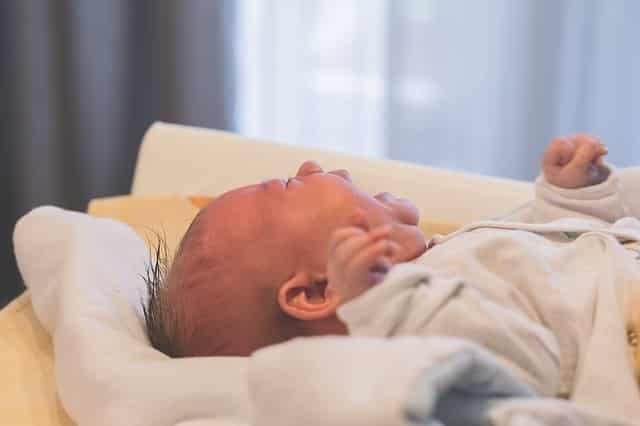As a new parent, you might get baffled when your baby cries after eating. Moreover, you have to consider plenty of reasons why your baby is acting up even after feeding.
Oftentimes, crying is usually a classic sign that your baby is hungry, but if your baby continues to cry even after feeding, there might be something that you are missing out on in your baby’s feeding routine. Let’s find out in this article.
Baby Cries After Eating
It is normal for babies to cry. However, when your baby cries for more than 3 hours a day it may be classified as colic in babies. On the other hand, if your baby cries right after your feeding routine, you might be forgetting to burp your baby and your baby is already feeling discomfort due to being gassy.
Depending on your baby’s age, he or she may be able to burp on his or her own. However, if your baby is below 3 months old, you may have to burp your baby to avoid discomfort due to ingesting air after feeding. If your baby is being bottle-fed using a fast-feeding bottle, your baby is more likely to ingest more air, making your baby gassy.
If you are feeding your baby with formula milk, you may want to check the ingredients of your formula if your baby cries shortly after ingesting the milk, even after burping. Your baby might be allergic to one or more ingredients in your formula milk and it might be causing discomfort in your baby’s digestive system, causing your baby to cry excessively after feeding.
If your baby has already begun eating mashed or solid foods, and your baby cries shortly after eating, the food might not be well tolerated by your baby’s digestive system. Moreover, it might also be caused by food intolerance that is causing discomfort in your baby, causing him or her to cry after feeding.
Food allergy or intolerance in babies may be exhibited in many ways. Moreover, food allergy and intolerance can almost surely cause your baby to cry excessively after a meal. To prevent this, you may introduce the new food gradually in your baby’s diet to make sure that the food does not trigger any unwanted reactions in your baby’s system.
Is Your Baby Gassy?
When your baby cries after eating, your baby might be gassy. However, it is quite normal that your baby feels gassy after eating. Your baby would normally ingest air together with the milk. But, the same happens when your baby ingests mashed or solid foods.

Here are some ways to prevent your baby from being gassy and avoiding post-feeding crying sessions:
- Burp your baby after feeding
- Feed-in an upright position
- Exercise your baby’s legs
- Prevent colic to reduce air ingestion
- Don’t let your baby sleep immediately after feeding, wait for 20-30 minutes
- Avoid food that may cause allergies or intolerance
- Bottle-feed your baby slowly
Acid Reflux
Acid reflux happens when ingested food backs up or refluxes from a baby’s stomach. When acid reflux occurs after feeding, your baby may then cry excessively. Even though acid reflux may not be a serious condition and may go away as your baby grows, it causes discomfort to your baby and may cause your baby to cry after feeding.
Twins and multiples that were born prematurely may be more prone to acid reflux as newborns. Moreover, if your babies often lie flat on their backs, especially after feeding, they are more prone to having acid reflux. Changing your baby’s position regularly and exercising their leg muscles regularly may help prevent acid reflux.
Gastroesophageal reflux (GER) is a more serious form of acid reflux that may contain enough acids from the stomach to potentially damage the lining in your baby’s esophagus. This is already a complication of acid reflux that may inhibit your baby’s growth.
Furthermore, if acid reflux persists when your baby is already beyond 18 months old, you may have to consult your baby’s pediatrician for possible interventions.
Your Baby is Teething
Teething is another milestone that parents usually celebrate. However, teething may also cause discomfort in infants. Once your baby is teething some gum sores may develop accompanying the growing tooth. Furthermore, sucking may cause these gum sores to hurt when your baby is feeding.
When your baby is teething, he or she may feel discomfort 3-5 days before the tooth emerges. During this time, your baby may cry more frequently due to the discomfort caused by the growing tooth. After breastfeeding or sucking milk from a bottle, your baby may then feel pain from the gum sores that may cause your baby to cry during or after feeding.
Mouth Sores
Mouth sores may also occur in children below 1 year old. When this happens, your baby may have difficulty in feeding and may sometimes refuse milk or soft food due to the pain. Furthermore, after your regular feeding routine, your baby may also cry excessively due to the pain caused by mouth sores that may last for 7-10 days.
Oral Thrush
Oral thrush is an overgrowth of naturally occurring fungi in a baby’s mouth. However, this type of fungi is supposed to be harmless under normal levels. When oral thrush occurs in your baby, there may be a visible appearance of patches that looks like cottage cheese that may not go away when wiped. Oral thrush may cause your baby to cry during and after feeding.
Conclusion
When your baby cries after eating, it may be caused by various things. However, most of these things usually go away on their own or they are easy to prevent. But, when your baby becomes fussy after eating and you notice signs of oral thrush or mouth sores, you may need to consult your pediatrician immediately.









 Store
Store